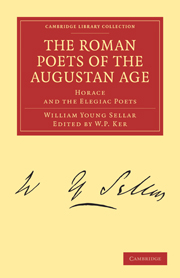WILLIAM YOUNG SELLAR
Published online by Cambridge University Press: 07 September 2011
Summary
To the last work of Mr. Sellar, it has been thought well to prefix a brief introductory memoir. As his nephew, his pupil, and one who found in his house another home, I attempt to tell, very briefly, the uneventful story of his life. By the aid of letters, and the reminiscences of friends, it would not be difficult to fill a volume with Mr. Sellar's biography. But it is improbable that he, who was absolutely devoid of literary self-consciousness and vanity, would have cared to be remembered, except in the affection of his friends and in the gratitude of his pupils. It must suffice, therefore, to give with brevity all that the readers of his books may find it desirable to know about the Author of the ‘Roman Poets of the Republic.’
Mr. Sellar was born at Morvich in Sutherland on Feb. 22, 1825, being the son of Mr. Patrick Sellar and his wife, whose maiden name was Craig. The name of Sellar is very common in Oxfordshire, and it is not impossible that a progenitor of the family, which had long been settled in Elgin, came north with the Cromwellian forces. Mr. Sellar's father was an agent, or Factor, of the Sutherland family. In middle life he purchased the estates of Ardtornish and Acharn, on the Sound of Mull. His children were seven boys and two girls, Mr. William Young Sellar being his fourth child, and third son. Their childhood was passed at Morvich, a house of the Duke of Sutherland's, near the river Fleet, not far from Golspie.
- Type
- Chapter
- Information
- The Roman Poets of the Augustan AgeHorace and the Elegiac Poets, pp. xxi - xlviPublisher: Cambridge University PressPrint publication year: 2010First published in: 1892



